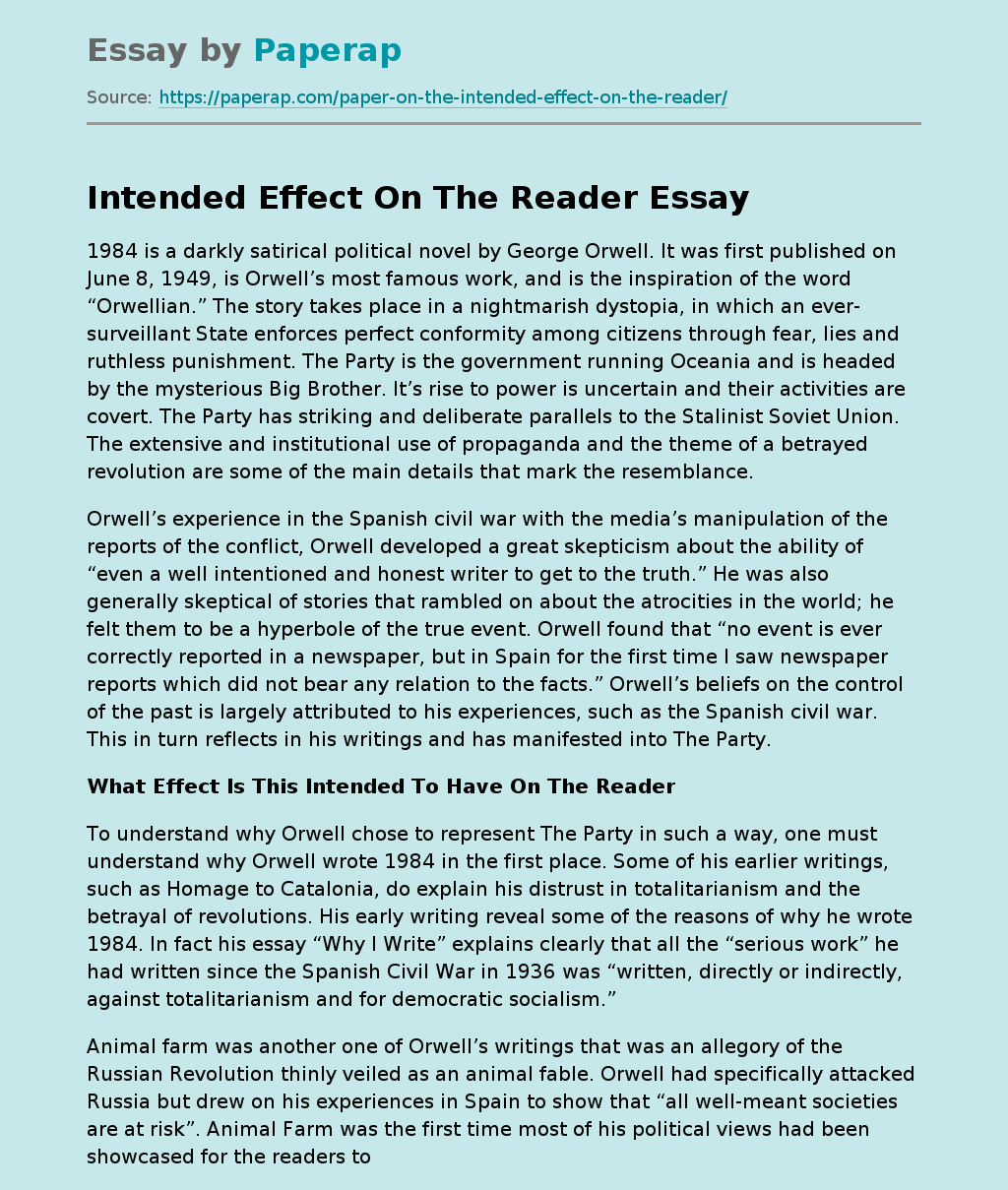Intended Effect On The Reader
1984 is a darkly satirical political novel by George Orwell. It was first published on June 8, 1949, is Orwell’s most famous work, and is the inspiration of the word “Orwellian.” The story takes place in a nightmarish dystopia, in which an ever-surveillant State enforces perfect conformity among citizens through fear, lies and ruthless punishment. The Party is the government running Oceania and is headed by the mysterious Big Brother. It’s rise to power is uncertain and their activities are covert. The Party has striking and deliberate parallels to the Stalinist Soviet Union.
The extensive and institutional use of propaganda and the theme of a betrayed revolution are some of the main details that mark the resemblance.
Orwell’s experience in the Spanish civil war with the media’s manipulation of the reports of the conflict, Orwell developed a great skepticism about the ability of “even a well intentioned and honest writer to get to the truth.” He was also generally skeptical of stories that rambled on about the atrocities in the world; he felt them to be a hyperbole of the true event.
Orwell found that “no event is ever correctly reported in a newspaper, but in Spain for the first time I saw newspaper reports which did not bear any relation to the facts.” Orwell’s beliefs on the control of the past is largely attributed to his experiences, such as the Spanish civil war. This in turn reflects in his writings and has manifested into The Party.
What Effect Is This Intended To Have On The Reader
To understand why Orwell chose to represent The Party in such a way, one must understand why Orwell wrote 1984 in the first place.
Some of his earlier writings, such as Homage to Catalonia, do explain his distrust in totalitarianism and the betrayal of revolutions. His early writing reveal some of the reasons of why he wrote 1984. In fact his essay “Why I Write” explains clearly that all the “serious work” he had written since the Spanish Civil War in 1936 was “written, directly or indirectly, against totalitarianism and for democratic socialism.”
Animal farm was another one of Orwell’s writings that was an allegory of the Russian Revolution thinly veiled as an animal fable. Orwell had specifically attacked Russia but drew on his experiences in Spain to show that “all well-meant societies are at risk”. Animal Farm was the first time most of his political views had been showcased for the readers to see. As the pigs gained power, they found that they fell prey to ambition, selfishness and hypocrisy. Their abuse of power led them to do all the things that Old Major has specifically urged them not to do. Orwell’s message is that any society with leaders that have absolute power is ultimately doomed to failure due to the leader’s inevitable fall to temptation and commencement of their abuse of power. The Party as well as Oceania is the result of this belief. The power is misused to suppress individual freedom for the benefit of those who run such a government.
Orwell once said he writes “because there is some lie that I want to expose”. It is this fundamental lie upon which the political structure of ‘Nineteen Eighty-four’ rests. The very slogans of the party are contradictions: “War is Peace, Freedom is Slavery, Ignorance is Strength”. The purpose of the Party was not to rule for the general good, but in order to have control over everyone and everything. Power is everything. Orwell truly believed that The Party could exist, his depiction of The Party can easily be an exaggeration, however it was his worst nightmare.
In 1984 the idea of Big Brother surveillance, Room 101, the destruction of language and replacement with Newspeak, the idea of puppet master controlling society and Winston being represented as the last free thinker. This is Orwell’s technique to persuade society to avoid such a dystopia. The intensity of every move The Party makes, is Orwell’s cry for realisation in the readers. Thus, The Party is represented as a brutal, malevolent and sinister group.
Orwell’s theories and speculations makes the reader question the system of Government they follow. His theories resemble some classic Big Brother fears that are quite prominent in more modern times.His work was based off the Stalinistic government and during that time Big Brother was a concept to be feared. Even today with the increase in technological advances and the constant scandals being uncovered in government officials, the idea of a secret underground base filled with surveillance technology is quite probable.
It is a combination of Orwell’s opinions and experiences that influenced his portrayal of The Party. The Spanish civil war, working in BBC and such have, in fact, influenced his opinions about totalitarianism. Although, already against it Orwell’s animosity towards the type of regime strengthened. The Party is Orwell’s way of warning society that the wheels were in motion right under their noses. His eclecticism of experiences and ideas caused him to form his perfect nightmare and communicate it in the book 1984. His political views were as staunch as he was and he tried to use his power over the English language to inform and scare his readers into realising the present danger. Thus, The Party was born in all its imperialism, hatred and evil.
Intended Effect On The Reader. (2019, Dec 05). Retrieved from https://paperap.com/paper-on-the-intended-effect-on-the-reader/

